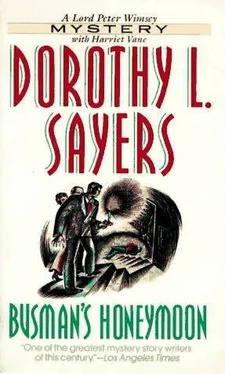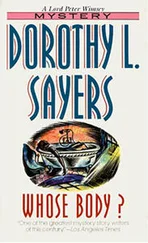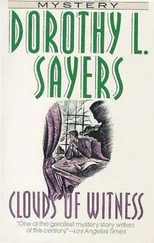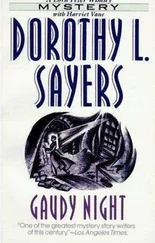Dorothy Sayers - Busman’s Honeymoon
Здесь есть возможность читать онлайн «Dorothy Sayers - Busman’s Honeymoon» весь текст электронной книги совершенно бесплатно (целиком полную версию без сокращений). В некоторых случаях можно слушать аудио, скачать через торрент в формате fb2 и присутствует краткое содержание. Жанр: Детектив, на английском языке. Описание произведения, (предисловие) а так же отзывы посетителей доступны на портале библиотеки ЛибКат.
- Название:Busman’s Honeymoon
- Автор:
- Жанр:
- Год:неизвестен
- ISBN:нет данных
- Рейтинг книги:4 / 5. Голосов: 1
-
Избранное:Добавить в избранное
- Отзывы:
-
Ваша оценка:
- 80
- 1
- 2
- 3
- 4
- 5
Busman’s Honeymoon: краткое содержание, описание и аннотация
Предлагаем к чтению аннотацию, описание, краткое содержание или предисловие (зависит от того, что написал сам автор книги «Busman’s Honeymoon»). Если вы не нашли необходимую информацию о книге — напишите в комментариях, мы постараемся отыскать её.
Busman’s Honeymoon — читать онлайн бесплатно полную книгу (весь текст) целиком
Ниже представлен текст книги, разбитый по страницам. Система сохранения места последней прочитанной страницы, позволяет с удобством читать онлайн бесплатно книгу «Busman’s Honeymoon», без необходимости каждый раз заново искать на чём Вы остановились. Поставьте закладку, и сможете в любой момент перейти на страницу, на которой закончили чтение.
Интервал:
Закладка:
‘All right, Sellon. That’ll do. Buzz off now like a good chap.’
Sellon went out; and there was a pause.
‘Peter,’ said Harriet.
He looked round, in time to see Crutchley hauled past the window, still struggling in the four men’s hands.
‘Come and hold my hand,’ he said. ‘This part of the business always gets me down.’
Epithalamion
Verges: You have always been called a merciful man, partner.
Dogberry: Truly, I would not hang a dog by my will, much more a man.
– William Shakespeare: Much Ado About Nothing .
Miss Harriet Vane, in those admirable detective novels with which she was accustomed to delight the hearts of murder-fans (see blurb), usually made a point of finishing off on a top-note. Mr Robert Templeton, that famous though eccentric sleuth, would unmask his murderer with a flourish of panache in the last chapter and retire promptly from the stage amid a thunder of applause, leaving somebody else to cope with the trivial details of putting the case together.
What happened in real life, she discovered, was that the famous sleuth, after cramming down a hasty lunch of bread and cheese, which he was almost too pre-occupied to eat, spent the rest of the afternoon at the police station, making an interminable statement. The sleuth’s wife and servant also made statements, and all three were then bundled unceremoniously out while statements were taken from the sweep, the charwoman and the vicar; after which, the police were prepared, if the going looked good, to sit up all night taking a statement from the prisoner. A further agreeable feature was a warning that neither the sleuth nor any of his belongings was to leave the country, or indeed go anywhere, without previously informing the police, since the next part of the procedure might take the form of a batch of summonses to appear before the magistrates. Returning home from the police-station, the sleuth family found the house occupied by a couple of constables taking photographs and measurements, preparatory to removing the wireless cabinet, the brass chain, the hook and the cactus to figure as Exhibits A to D. These were by now the only portable objects left in the house, other than the owners’ personal property; since George and Bill had finished the job and left with their van. There had been difficulty and delay in persuading them to leave without the wireless set; but here the arm of the law at length prevailed. At last the police went away and left them alone.
Harriet looked round the empty sittingroom with a curiously blank sensation. There was nothing to sit on except the window-sill, so she sat on that Bunter was upstairs, locking trunks and suit-cases. Peter walked aimlessly up and down the room.
‘I’m going up to Town,’ he said abruptly. He looked vaguely at Harriet. ‘I don’t know what you’d care to do.’
This was disconcerting, because she could not tell from his tone whether he wanted her in London or not. She asked:
‘Shall you be staying the night in Town?’
‘I don’t think so, but I must see Impey Biggs.’
So that was the difficulty. Sir Impey Biggs had been her own counsel when she had stood her trial, and Peter was wondering how she would take the mention of his name.
‘Do they want him for the prosecution?
‘No; I want him for the defence.’
Naturally-what a stupid question.
‘Crutchley must be defended, of course,’ pursued Peter, ‘though at the moment he’s in no state to discuss anything. But they’ve persuaded him to let a solicitor act for him. I’ve seen the man and offered to get Biggy for them. Crutchley needn’t know we’ve had anything to do with it. He probably won’t ask.’
‘Must you see Sir Impey today?’
‘I’d rather. I rang him up from Broxford. He’s in the House tonight, but he can see me if I go round after the debate on some Bill or other he’s concerned in. That will make it rather late for you, I’m afraid.’
‘Well,’ said Harriet, resolved to be reasonable whatever happened, ‘I think you had better run me up to Town. Then we can sleep at an hotel, if you like, or in your mother’s house, if the servants are there; or if you’d rather stay at your club, there’s a friend I can always ring up; or I can get out my own car and run down to Denver ahead of you.’
‘Resourceful woman! We’ll go to Town, then, and wait upon the event.’
He seemed relieved by her readiness to accommodate herself, and presently went out to do something or other to the car. Bunter came down, looking worried.
‘My lady, what would you’ wish to have done with the heavy luggage?’
‘I don’t know, Bunter. We can’t very well take it to the Dower House, and if we take it to Town, there’s nowhere much to put it, except the new house-and I don’t suppose we shall be going there, yet awhile. And I don’t care to leave it here, with no one to see to it, since we can’t possibly come back for some time. Even if his lordship-that is to say, we should have to get some furniture in.’
‘Precisely, my lady.’
‘I suppose you have no idea what his lordship is likely to decide?’
‘No, my lady, I regret to say I have not.’
For nearly twenty years, Bunter had known no plans which did not include the Piccadilly flat; and he was for once at a loss.
‘I’ll tell you what,’ said Harriet. ‘Go up to the vicarage and ask Mrs Goodacre from me whether we may leave it with her for a few days till we have made our plans. She can then send it on, carriage forward. Make some excuse for my not going myself. Or find me a piece of paper and I will write a note. I would rather his lordship could find me here when he wants me.’
‘I understand perfectly, my lady. If I may say so, I think that will be an excellent arrangement.’
One felt rather shabby, perhaps, for not going to say au revoir to the Goodacres. But, quite apart from what Peter might or might not want, the thought of Mrs Goodacre’s questions and Mr Goodacre’s lamentations was a daunting one. When Bunter returned, bringing a cordial note of assent from the vicar’s wife, he reported that Miss Twitterton was also at the parsonage, and Harriet was more than ever thankful to have escaped.
Mrs Ruddle seemed to have disappeared. (She and Bert were, indeed, having a sumptuous six o’clock tea with Mrs Hodges and a few neighbours, eager to have their news served up piping hot.) The only person who lingered to bid them farewell was Mr Puffett. He did not intrude; only, as the car moved out into the lane, he popped into ken from the top of a neighbouring gate, where he seemed to have been enjoying a peaceful smoke.
‘Jest,’ said Mr Puffett, ‘to wish you luck, me lord and me lady, and ’ope as we shall be seem’ you ’ere again afore long. You ain’t ’ad things so comfortable as you might ’ave ’oped, but there’s more than one ’ud be sorry if you wos to take a misliking to Paggleham on that account. And if you’d like them chimneys given a thorough over’aul. or any other little job in the sweepin’ or buildin’ line. you’ve only to mention it and I’d be ’appy to oblige.’
Harriet thanked him very much.
‘There’s one thing,’ said Peter. ‘Over at Lopsley there’s a sun-dial in the old churchyard, made from one of our chimney-pots. I’m writing to the squire to offer him a new sun-dial in exchange. May I tell him that you will call for the old one and see to getting it put back?’
‘I’ll do that and welcome,’ said Mr Puffett.
‘And if you know where any of the others have gone, you might let me know.’
Mr Puffett promised readily that he would. They shook hands with him, and left him standing in the middle of the lane, cheerfully waving his bowler till the car had turned the corner.
Читать дальшеИнтервал:
Закладка:
Похожие книги на «Busman’s Honeymoon»
Представляем Вашему вниманию похожие книги на «Busman’s Honeymoon» списком для выбора. Мы отобрали схожую по названию и смыслу литературу в надежде предоставить читателям больше вариантов отыскать новые, интересные, ещё непрочитанные произведения.
Обсуждение, отзывы о книге «Busman’s Honeymoon» и просто собственные мнения читателей. Оставьте ваши комментарии, напишите, что Вы думаете о произведении, его смысле или главных героях. Укажите что конкретно понравилось, а что нет, и почему Вы так считаете.












